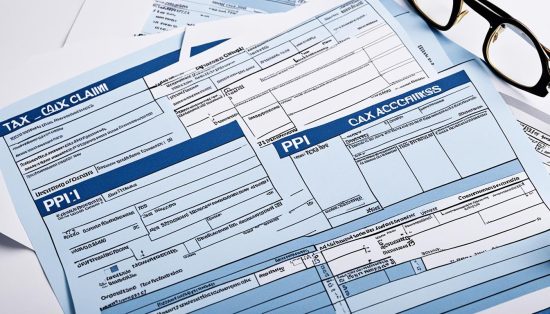Did you know that over £38 billion has been paid out in Payment Protection Insurance (PPI) compensation claims in the UK since 2011? This staggering figure serves as a stark reminder of the widespread mis-selling that occurred within the financial services industry. However, what many individuals may not realise is that a portion of these PPI pay-outs is subject to taxation, known as the ‘PPI tax’.
This comprehensive article delves into the intricacies of PPI tax, providing you with a clear understanding of what it is, how it differs from PPI compensation, and the steps you can take to claim a PPI tax refund if you’re eligible. We’ll also explore the role of PPI claims management companies, the time limits for making a claim, and the available resources and support to guide you through the process.
Whether you’ve already received a PPI pay-out or are still in the process of making a claim, this article is your essential guide to navigating the complexities of PPI tax. By the end, you’ll be equipped with the knowledge to make an informed decision and potentially reclaim the tax deducted from your PPI compensation.
Understanding PPI Payments and Taxation
When it comes to PPI (Payment Protection Insurance) pay-outs, there are two main elements that customers need to be aware of: the compensation and the statutory interest. The compensation refers to the refund of the PPI premiums paid, as well as the interest paid on those premiums. This portion of the pay-out is not considered taxable income.
1. PPI Pay-outs: Compensation and Statutory Interest
The second element of a PPI pay-out is the statutory interest, which is paid at a rate of 8% per annum. This interest is paid in recognition of the fact that the customer was deprived of their money for some time. It is this statutory interest element that is considered taxable income.
2. Taxable Element: The Statutory Interest
The tax on the statutory interest is typically deducted at source by the financial institution before the payment is made to the customer. However, the customer may be eligible for a refund of the tax deducted if their total taxable income, including the PPI statutory interest, falls within their Personal Savings Allowance or their tax-free personal allowance.
Tax Deduction at Source and Eligibility for Refunds
The Personal Savings Allowance allows individuals to earn up to £1,000 (basic rate taxpayers) or £500 (higher rate taxpayers) in savings income, including PPI statutory interest, without paying any tax. If the customer’s total taxable income, including the PPI statutory interest, is below the personal allowance threshold, they may also be eligible for a full tax refund.

What is PPI Tax?
PPI tax refers to the tax that is deducted from the statutory interest element of a PPI (Payment Protection Insurance) pay-out. This is a distinct concept from the PPI compensation itself, which is the refund of the PPI premiums paid and the interest paid on those premiums.
Definition of PPI Tax
The tax deducted on the statutory interest is usually at the basic rate of 20%, and it is then passed on to Her Majesty’s Revenue and Customs (HMRC) on the customer’s behalf. The amount of PPI tax depends on the amount of statutory interest received and the customer’s overall taxable income in the relevant tax year.
Difference from PPI Compensation
It is important to understand the difference between PPI tax and PPI compensation. While the PPI compensation is the refund of the premiums and interest paid, the PPI tax is the amount of tax deducted from the statutory interest element of the pay-out.
How PPI Tax is Calculated?
The amount of PPI tax that is deducted depends on the amount of statutory interest received and the customer’s overall taxable income in the relevant tax year. The tax is typically deducted at the basic rate of 20% before the payment is made to the customer.

Eligibility for Claiming PPI Tax Refund
Customers may be eligible for a PPI tax refund if their total taxable income, including the PPI statutory interest, falls within their Personal Savings Allowance or their tax-free personal allowance. The Personal Savings Allowance allows individuals to earn up to £1,000 (basic rate taxpayers) or £500 (higher rate taxpayers) in savings income, including PPI statutory interest, without paying any tax.
Personal Savings Allowance and Taxable Income
If the customer’s total taxable income, including the PPI statutory interest, is below the personal allowance threshold, they may also be eligible for a full tax refund. This means that individuals with a total taxable income, including the PPI statutory interest, below £12,500 (the current personal allowance for the 2023-24 tax year) may be able to reclaim the entire amount of PPI tax deducted.
Scenarios for Claiming PPI Tax Refunds
There are a few key scenarios where customers may be eligible to claim a PPI tax refund:
- If the customer’s total taxable income, including the PPI statutory interest, falls within their Personal Savings Allowance of £1,000 (basic rate taxpayers) or £500 (higher rate taxpayers).
- If the customer’s total taxable income, including the PPI statutory interest, is below the personal allowance threshold of £12,500 (for the 2023-24 tax year).
- If the customer’s total taxable income, including the PPI statutory interest, is low enough that they would have paid less than the 20% tax deducted at source.
By carefully reviewing their personal circumstances and financial situation, customers can determine if they are eligible to claim a PPI tax refund and take the necessary steps to recover the tax deducted from their PPI pay-outs.

Claiming a PPI Tax Refund
To initiate the process of claiming a PPI tax refund, customers can utilise form R40, which is readily available on the GOV.UK website. This comprehensive form requires the individual to provide the net interest received, the tax deducted, and the gross amount of the interest.
1. Form R40 and Completion Guidelines
The R40 form includes detailed guidance on how to accurately complete the required information. An example form is also available on the HMRC website, serving as a valuable resource for customers seeking to understand the format and ensure a successful submission.
2. Online vs. Postal Submission
Customers have the flexibility to submit their PPI tax refund claim either online or by post. The online submission process allows for a more streamlined and efficient experience, while the postal option caters to those who prefer traditional methods. Regardless of the chosen route, HMRC provides clear instructions to assist individuals throughout the claim process.
Information Required for PPI Tax Claim
To successfully claim a
PPI tax refund, customers must have access to specific information regarding their PPI pay-outs. This includes the net amount of interest received, the tax deducted, and the gross amount of the interest.
1. Net Interest Received
The net amount of interest received is the actual amount the customer received after the tax deduction. This figure is crucial for calculating the correct refund amount and ensuring the claim is processed accurately.
2. Tax Deducted and Gross Interest
In addition to the net interest, customers will need to know the amount of tax deducted from the PPI statutory interest payment. This, along with the gross amount of the interest, provides the necessary information to determine the appropriate tax refund.
Obtaining Information from Financial Institutions
If the customer has misplaced the letters accompanying the PPI pay-outs, they may need to request the required information directly from the financial institution that made the payment. Customers can make a formal Subject Access Request (SAR) to the bank or financial institution to obtain the net interest received, tax deducted, and gross interest details.

PPI Claims Management Companies
Many consumers in the United Kingdom have utilised the services of PPI claims management companies to assist with their PPI pay-outs. These specialised firms have played a significant role in the PPI mis-selling scandal, helping individuals reclaim the premiums they were unfairly charged.
Use of Claims Management Companies
PPI claims management companies have been instrumental in the PPI reclaiming process. They have the expertise and resources to navigate the complexities of the PPI claims system, ensuring that consumers receive the maximum compensation they are entitled to. These companies have been particularly helpful for those who may have struggled to make a claim on their own or were unsure of the steps involved.
Potential Partnerships with Tax Refund Companies
Some PPI claims management companies have established partnerships with tax refund companies, which can further assist consumers in reclaiming the tax deducted from their PPI pay-outs. These partnerships may result in the PPI claims management company passing the customer’s details to the tax refund company, streamlining the process of claiming a PPI tax refund.
Precautions When Signing Up for Services
Consumers should exercise caution when signing up for any services offered by PPI claims management companies or their partners. It is crucial to carefully read and understand the terms and conditions, as agreeing to them or providing an electronic signature may be interpreted as consent for the tax refund company to act on the customer’s behalf. Customers should thoroughly review all agreements before committing to any services to ensure they are making an informed decision that aligns with their best interests.
Time Limits for Claiming PPI Tax Refunds
When it comes to claiming PPI tax refunds, it’s crucial for customers to be aware of the time limits set by Her Majesty’s Revenue and Customs (HMRC). According to the guidelines, HMRC can only consider claims for PPI tax refunds dating back to the tax year 2019/20.
Any PPI tax refund claims for earlier tax years are considered out of date and cannot be processed. This means that customers who have received PPI compensation and had PPI tax deducted from their payouts must act quickly if they wish to reclaim the PPI tax they’ve paid.
It’s crucial for PPI claimants to be mindful of these time limitations when considering making a PPI tax refund claim. Failure to do so may result in missed opportunities to recover the PPI tax that was deducted from their PPI compensation payments.
Getting Help and Support
For individuals seeking assistance with their PPI tax refund claims, HMRC provides a range of resources and support options. Customers can access valuable information and detailed guidance on the GOV.UK website, covering the PPI tax refund process, eligibility criteria, and the necessary steps to submit a claim.
HMRC Resources and Assistance
The GOV.UK website offers a dedicated section on PPI tax refunds, where customers can find step-by-step instructions, downloadable forms, and examples to help them navigate the claim process. Additionally, HMRC’s customer service team is available to provide further support and answer any specific questions customers may have regarding their PPI tax refund claim.
Seeking Professional Advice
While the resources provided by HMRC can be helpful, some customers may prefer to seek personalised advice from a tax accountant or financial advisor. These professionals can review the customer’s individual circumstances, ensure the claim is correctly submitted, and provide guidance on maximising the potential PPI tax refund. Seeking professional assistance can be particularly beneficial for those with more complex financial situations or those requiring additional support throughout the claim process.
Conclusion
In conclusion, PPI tax refers to the tax deducted from the statutory interest element of PPI pay-outs. Customers may be eligible for a PPI tax refund if their total taxable income, including the PPI statutory interest, falls within their Personal Savings Allowance or their tax-free personal allowance. By following the steps outlined in this article, customers can claim a PPI tax refund and potentially recover the tax deducted from their PPI pay-outs.
Whether you’ve been mis-sold PPI, filed a PPI complaint, or received PPI compensation, it’s crucial to understand the tax implications and your rights when it comes to PPI tax refunds. By staying informed and taking the necessary steps, you can ensure that you’re not overpaying on your PPI pay-outs and maximise the financial benefits of reclaiming mis-sold PPI.
Remember, the process for claiming a PPI tax refund can be complex, so don’t hesitate to seek professional advice or utilise the resources provided by HMRC if you need further assistance. With the right guidance and determination, you can navigate the PPI tax landscape and secure the rightful refund you deserve.
FAQ
1. What is PPI tax?
PPI tax refers to the tax deducted from the statutory interest element of PPI (Payment Protection Insurance) pay-outs. It is different from the PPI compensation, which is the refund of the PPI premiums paid and the interest paid on those premiums.
2. How is PPI tax calculated?
The tax deducted on the statutory interest is usually at the basic rate of 20%, and it is then passed on to Her Majesty’s Revenue and Customs (HMRC) on the customer’s behalf. The amount of PPI tax depends on the amount of statutory interest received and the customer’s overall taxable income in the relevant tax year.
3. Who is eligible for a PPI tax refund?
Customers may be eligible for a PPI tax refund if their total taxable income, including the PPI statutory interest, falls within their Personal Savings Allowance or their tax-free personal allowance. The Personal Savings Allowance allows individuals to earn up to £1,000 (basic rate taxpayers) or £500 (higher rate taxpayers) in savings income, including PPI statutory interest, without paying any tax.
4. How do I claim a PPI tax refund?
To claim a PPI tax refund, customers can use form R40, which is available on the GOV.UK website. The form requires the customer to provide the net interest received, the tax deducted, and the gross amount of the interest. Customers can submit the form online or by post.
5. What information do I need to claim a PPI tax refund?
To claim a PPI tax refund, customers need to know the net amount of interest received, the tax deducted, and the gross amount of the interest. If the customer has lost the letters that accompanied the PPI pay-outs, they may need to request this information from the financial institution that made the payment.




















No Comments
Leave a comment Cancel